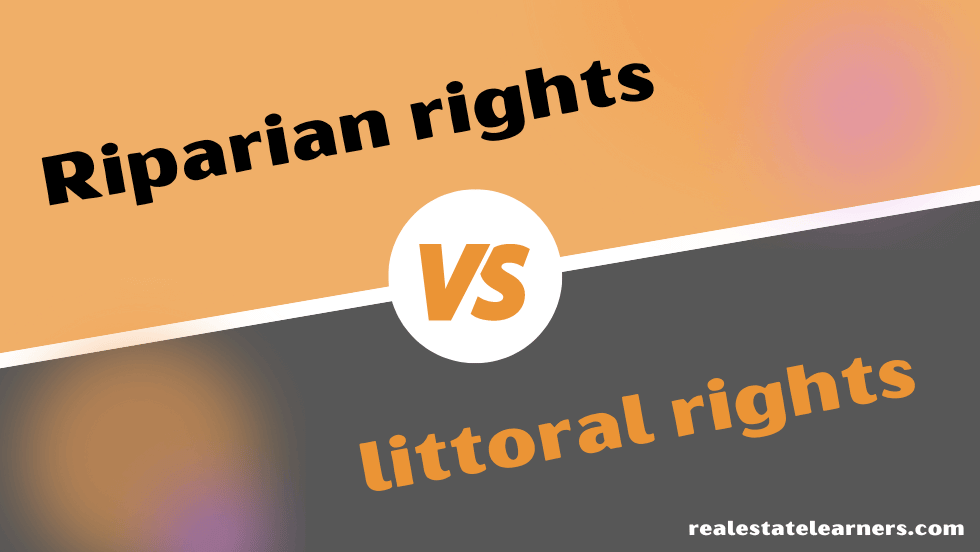Real estate is a vast and complex industry with many different aspects that can be explored. One of these aspects is the concept of littoral rights, which refers to the ownership and use of land along bodies of water such as lakes, rivers, or oceans.
Littoral rights play an essential role in real estate transactions and can significantly impact property value.
This document will delve deeper into littoral rights real estate, discussing what they are, who has them, and how they can affect property ownership and use.
What are littoral rights in real estate?
Littoral rights in real estate refer to the legal rights and restrictions that apply to properties located along a body of water, such as a river, lake, or ocean.
These rights typically include access to the water for recreational use, navigation, fishing, and the right to construct docks or piers on the property. However, littoral rights also come with certain responsibilities, such as maintaining and protecting the shoreline from erosion.
These rights can vary depending on the jurisdiction and may be affected by waterfront property laws and regulations. Property owners need to understand their littoral rights to make informed decisions about the use and development of their land.
Among other things, understanding littoral rights can also help mitigate potential disputes with neighboring property owners over water access and usage. Additionally, these rights can impact the value of a property and should be carefully considered when buying or selling waterfront real estate.
What is an example of a littoral?
A lakeside cabin with access to the water for boating and fishing.
A beachfront property with a private section of beach for sunbathing and swimming. An oceanfront house with a dock for mooring boats.
A riverfront estate with riparian rights allows the owner to use the water for irrigation or hydroelectric power. A coastal property with a seawall built to protect the shoreline from erosion.
Riparian rights vs littoral rights?
Riparian rights and littoral rights refer to legal rights and restrictions related to properties located along bodies of water.
The main difference between the two is that riparian rights pertain to properties adjacent to streams, rivers, or creeks. In contrast, littoral rights apply to properties next to lakes, oceans, or other large bodies of water.
Riparian rights often include the right to use water for domestic or agricultural purposes, while littoral rights may focus more on recreational and navigational uses.
Unlike riparian rights, which are based on land ownership adjacent to a body of water, littoral rights can also be obtained through easements or other legal agreements.
Both riparian and littoral rights are subject to government regulations and may vary depending on the specific location and jurisdiction.
Real estate professionals must thoroughly understand both riparian and littoral rights when working with waterfront properties.
What are some common issues and disputes involving littoral rights?
Erosion control: Property owners with littoral rights are responsible for maintaining and protecting the shoreline from erosion. Disagreements can arise when neighboring properties are affected by changes to the shoreline.
Water access: Littoral rights typically include limited access to the water, but disputes can occur over excessive usage or obstruction of access to the water.
Dock construction: While property owners have the right to construct a dock or pier on their land, there may be restrictions on the size and location of these structures that can lead to disputes with neighboring properties.
Boundary disputes: The exact boundaries of littoral rights can sometimes be unclear, leading to conflicts over ownership and access to certain waterfront areas.
Water quality: Littoral rights are also responsible for not polluting or harming the water. Disputes can occur when one property owner’s actions affect the water quality of neighboring properties.
Property owners must clearly understand their littoral rights and responsibilities to prevent or resolve conflicts with neighboring properties. Seeking legal advice and conducting thorough research on local laws and regulations is crucial when dealing with issues related to littoral rights in real estate.
Conclusion
Littoral rights are essential to real estate, particularly for waterfront properties. They provide owners with valuable access and usage rights to bodies of water but also come with responsibilities and potential legal issues.
Understanding littoral rights can help property owners make informed decisions regarding their land and prevent disputes with neighboring properties. Real estate professionals should have a thorough understanding of these rights to assist clients with waterfront properties.

Corey has over 15 years of experience as a real estate broker and educator. He is dedicated to providing valuable insights and guidance for those looking to enter the real estate industry.

